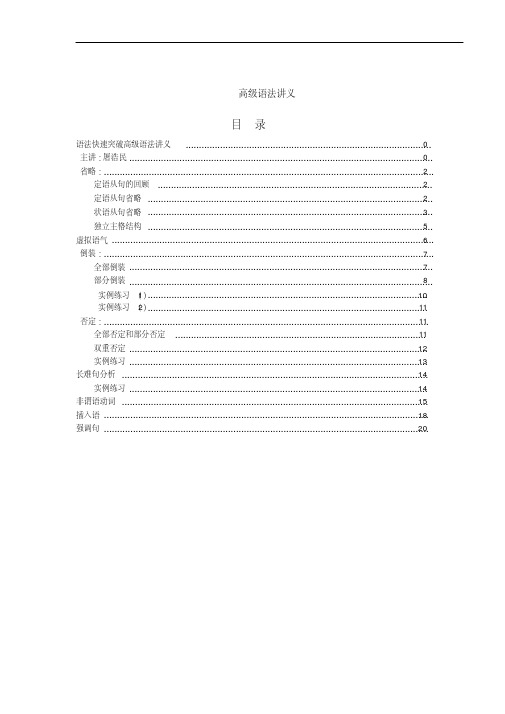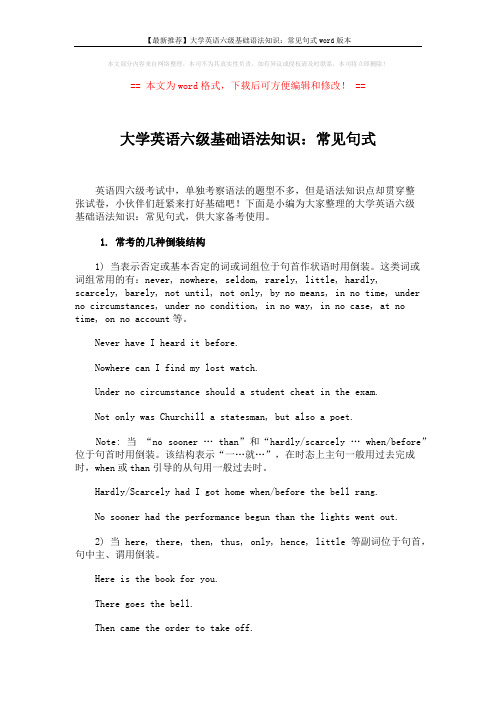英语六级语法重点讲解
大学英语六级基础语法:情态动词.doc

2019年6月大学英语六级基础语法:情态动词大学英语六级基础语法:情态动词1、情态动词的完成式1)must have done表示对过去的事情较有把握的、肯定性的推测,常译为一定,准是,肯定,其否定形式是cant/couldnthave done,意为决不可能,不太可能。
e.g. Since the ditch is full of water, it must have rained last night.2)should/ought to have done表示过去应该做的却没有做,常含有后悔、责备、埋怨的口吻,意为本应该,应该就好了; e.g. With all the work finished, I should have gone to your birthday party last night.3)shouldnt/ought not to have done表示过去不该做的事却给做了,也常含有责备、不满之意,意为本不该。
e.g. You shouldnt have gone back to work yesterday without the doctors permission.4)may/might have done表示对过去的事情的推测,但不十分有把握,意为可能,或许已经。
e.g. A traffic accident happened yesterday and a driver may have been hurt.5)could have done表示过去有可能或有能力做某事,而实际未做、未能实现的事;有时也表示轻度批评,意为本来可以,完全可以。
e.g. The gas leakage could have been avoided if thegas company took immediate measures after the warning call.6)neednt have done表示过去做了某事,但没有做的必要,意为其实没有必要。
英语语法几大从句(六级)

名词性从句常见考点突破一、名词性从句的概念及分类1.顾名思义不,名词性从句就是指在句子中起名词作用的句子,功能相当于名词词组。
2.根据其在句中不同的语法功能,名词性从句可以分为主语从句、宾语从句、表语从句和同位语从句。
同位语从句起对前面的名词进一步解释说明的作用,陈述该名词的内容。
二、名词性从句的三类引导词1.连接词,包括that,whether和if。
that用来引导陈述句,whether和if引导一般疑问句(从句中的一般疑问句要用陈述句语序,而if引导的从句不能作主语)。
2.wh-关系代词,如who,whom,whose,whatever,which等,这类词由于在句中作相应的句子成分,因此一般不能省略。
3.wh-关系副词,如when,why,how,where等,该类词一般也作相应的句子成分。
三、名词性从句的四种类型1.宾语从句①在许多情况下,作为真正宾语的that从句后置,而用it作形式宾语,此时,that不可省略。
例如:You may rely on it that I shall help you.(it作为形式宾语接在rely on后,真正的宾语是that引导的宾语从句。
另外,大多数介词不能直接跟that从句作宾语,所以此处需要it作形式宾语。
)②宾语从句分为三类:动词宾语从句、介词宾语从句和形容词宾语从句。
动词宾语从句指的是跟在动词之后且充当其宾语的从句;介词宾语从句指的是跟在一个介词之后充当其宾语的从句;同样,形容词宾语从句指的是跟在某些形容词后面,可理解为该形容词宾语的从句。
例如:I doubt whether he will come.(动词宾语从句)I'm curious as to what he will do.(介词宾语从句)I'm convinced that she is an honest girl.(形容词宾语从句)2.同位语从句①同位语从句就是跟在名词后面,表达具体内容、起解释说明作用的从句。
大学英语六级高级语法讲义

高级语法讲义目录语法快速突破高级语法讲义 .............................................................................................0主讲:屠浩民...................................................................................................................2省略:.............................................................................................................................定语从句的回顾........................................................................................................2定语从句省略............................................................................................................2状语从句省略............................................................................................................3独立主格结构............................................................................................................5虚拟语气..........................................................................................................................6倒装:.............................................................................................................................7全部倒装...................................................................................................................7部分倒装...................................................................................................................810实例练习(1)..........................................................................................................11实例练习(2).......................................................................................................... 否定:...........................................................................................................................11全部否定和部分否定 (11)12双重否定.................................................................................................................13实例练习................................................................................................................. 长难句分析....................................................................................................................1414实例练习.................................................................................................................15非谓语动词.................................................................................................................... 插入语...........................................................................................................................1820强调句...........................................................................................................................省略:定语从句的回顾Fruit that contains vitamin C can relieve a cold.The man who we met yesterday is a famous psychologist.iuThis is the right book that you are looking for.二、关系词充当宾语的时候三、关系词充当主语(1)谓语结构为实词(2)谓语结构为 be+ 名词四、先行词为the way定语从句省略A control box fitted to the car contains a mini-cellphone, a micro-processor and memory, and aGPS (全球定位系统) satellite positioning receiver. (06。
大学英语六级基础语法:独立结构.doc

2019年6月大学英语六级基础语法:独立结构英语六级基础语法:独立结构独立主格结构由名词或代词加上其他成分(分词、不定式、名词、代词、形容词、副词或介词短语)构成。
独立主格结构没有主语和谓语,所以在语法上不是句子。
但多有名词或代词表示的逻辑主语,分词或不定式表示的逻辑谓语,有时还有其他修饰成分。
(判断一个结构是否是句子的标准就是看看这个结构是否有谓语动词。
)这种结构通常在句子中起方式、时间、原因、条件等状语或状语从句的作用,主要用于书面语。
使用动词非谓语形式的独立主格结构可以改为句子形式(从句):独立主格结构加上连词,非谓语动词改为谓语动词形式,这样就成为从句了。
例如:Today being Sunday, the library isn\’ t open.今天星期天,图书馆不开放。
(原因)改为从句:As (Since) today is Sunday, the library isn\’ t open. 例如:There being no buses,we had to take a taxi. 没有汽车了,我们只好坐出租车了。
Because there were no buses, we had to take a taxi.The signal given,the bus started.信号发出后,公共汽车就启动了。
(时间)改为从句:After the signal was given, the bus started.The boy followed that man here,and climbed in,sword in hand.少年跟那个人到这里,并爬了进来,手里拿着剑。
The boy followed that man here,and climbed in,and had a sword in his hand. The mid-term examination is over, the end-of-term examination to come two months later.期中考试结束了,两个月之后进行期末考试.The mid-term examination is over, and the end-of-term examination is to come two months later.Weather permitting, we\’ 11 visit the Great Wall.如果天气允许的话,我们就去参观长城。
大学英语四六级考试常考语法精讲:不定式

最牛英语口语培训模式:躺在家里练口语,全程外教一对一,三个月畅谈无阻!洛基英语,免费体验全部在线一对一课程:/ielts/xd.html(报名网址)1. 某些动词后要接不定式某些及物动词后只能接不定式作宾语,其中最常用的动词有agree,afford,arrange,appear,ask,attempt,care,choose,continue,decide,demand,desire,determine,expect,fail,fear,forget,hate,hesitate,hope,intend,learn,like,love,manage,mean,neglect,offer,plan,prefer,prepare,pretend,promise,refuse,regret,remember,seek,tend,try,volunteer,want,wish等。
What do you plan to do tomorrow?She hated to move from such a nice village.In class teachers should try to get feedback from their students2. 不定式的被动式不定式有被动式,当不定式的逻辑主语是这个不定式所表示的动作的承受者,不定式要用被动式,在句中可作主语,宾语,定语,状语,复合宾语等。
作定语时,通常表示在谓语动作后将要发生的动作。
The last question to be discussed today is how to do the job more efficiently.She preferred to be given more difficult work to do.3. 不定式的完成式当不定式的动作发生在谓语动词的动作之前,不定式要用完成式,在句中可作宾语,状语以及构成复合宾语,复合谓语。
大学英语六级语法基础:时态(强烈推荐)

大学英语六级语法基础:一般现在时,过去时,过去完成时,现在完成时1.一般现在时(1)表示经常性、习惯性的动作;eg:I get up at 7 o' clock in the morning.I leave school for home at 6 every evening.(2)客观真理,客观存在,科学事实;eg:The teacher told us: the earth moves around the sun. Shanghai lies in the east of China.2.一般过去时两种变化形式:在动词后加ed或不规则变化的动词;在确定的过去时间里所发生的动作或存在的状态:常用时间状语有:yesterday, last week, an hour ago, the other day, in 1982等;eg:Did you go to Shanghai last week?补充:used to/be used to(1)used to + do:"过去常常",表示过去习惯性的动作或状态,但如今已不存在;eg:Mike used to take a walk.(2)be used to + doing:对……已感到习惯,或"习惯于",to是介词,后需加名词或动名词;eg:Mike is used to taking a walk.He is used to taking a shower with cold water.(3)be used to do:被用来做……eg:Leaves are used to fight enemies in Kong fu movies as the weapons.典型例题---- Your phone number again? I ___ quite catch it.---- It's 69568442.A. didn'tB. couldn'tC. don'tD. can't答案A. 本句虽没有明确的时间状语,但从语意上看出,在听的时候没有听懂这个动作发生在过去,因此应用过去时。
2014年英语六级语法重点解析

2014年英语六级2014年英语六级语法重点解析(一)语法在听力中的作用:在听力理解中,如何培养自己在片刻间获取信息,并能加以归纳和理解,除了要掌握英语口语中基本的语音现象外,还应熟练掌握英语语法中以及口语中的一些习惯表达法,而我们所谈到的听力中的语法又包括:1、听力中的词法在听力理解中,代词的指代、数词的读法、动词的时态、语态等其它词性的用法常常成为数词的用法理解的关键,并以数词频率最高。
For example1)M: Could you tell me the tometuble of the school bus?W: Well, the bus leaves here for the campus every two hours from7: 00 a.m. But on saturdays it states half an hour later.A. At 7:30B. At 9:00C. At 8:00D. At 9:302)M: I'd like to make two reservation on Hight 651 for June 8 th.W: I'm sorry, we're booked up on the 8th, but we still have a fewseats av ailable on the 9th.Q: When does the man want to leave?A. on the 9th of June.B. on the 8th of June.C. on the June.D. on the 7th of June.Explanation and Expansion:A) 参考答案:1)D 2)BB) 辨析:1) 从以上题中不难看出,考生必须听清题干所问,如1)中的The Second bus on Saturdays ,并对已知数据进行分析,平常为7:00,每两小时一趟,星期六晚发半小时,那么星期六第二趟车为7:30+2=9:30,D正确。
【最新推荐】大学英语六级基础语法知识:常见句式word版本 (4页)

本文部分内容来自网络整理,本司不为其真实性负责,如有异议或侵权请及时联系,本司将立即删除!== 本文为word格式,下载后可方便编辑和修改! ==大学英语六级基础语法知识:常见句式英语四六级考试中,单独考察语法的题型不多,但是语法知识点却贯穿整张试卷,小伙伴们赶紧来打好基础吧!下面是小编为大家整理的大学英语六级基础语法知识:常见句式,供大家备考使用。
1. 常考的几种倒装结构1) 当表示否定或基本否定的词或词组位于句首作状语时用倒装。
这类词或词组常用的有:never, nowhere, seldom, rarely, little, hardly, scarcely, barely, not until, not only, by no means, in no time, under no circumstances, under no condition, in no way, in no case, at no time, on no account等。
Never have I heard it before.Nowhere can I find my lost watch.Under no circumstance should a student cheat in the exam.Not only was Churchill a statesman, but also a poet.Note: 当“no sooner … than”和“hardly/scarcely … when/before”位于句首时用倒装。
该结构表示“一…就…”,在时态上主句一般用过去完成时,when或than引导的从句用一般过去时。
Hardly/Scarcely had I got home when/before the bell rang.No sooner had the performance begun than the lights went out.2) 当here, there, then, thus, only, hence, little等副词位于句首,句中主、谓用倒装。
